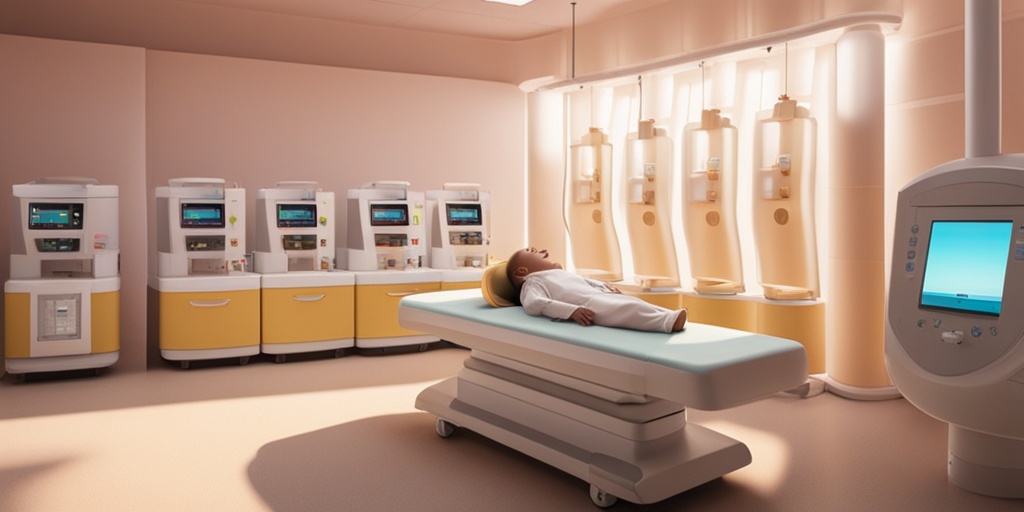What Is MPS I?
Mucopolysaccharidosis type I (MPS I) is a rare genetic disorder that affects the body’s ability to break down and recycle sugar molecules called glycosaminoglycans (GAGs). These molecules are found throughout the body and play a crucial role in maintaining healthy tissues and organs.
In people with MPS I, the deficiency of an enzyme called alpha-L-iduronidase leads to the accumulation of GAGs in cells, tissues, and organs. This accumulation causes a range of symptoms and complications that can affect various aspects of a person’s life.
MPS I is a lysosomal storage disorder, which means that the buildup of GAGs occurs within the lysosomes, the cell’s recycling centers. This disorder is inherited in an autosomal recessive pattern, meaning that a person needs to inherit two copies of the mutated gene (one from each parent) to develop the condition.
There are three main forms of MPS I, each with varying degrees of severity:
- Hurler syndrome: The most severe form, characterized by severe physical and mental disabilities, and a shortened lifespan.
- Hurler-Scheie syndrome: A moderate form, characterized by physical disabilities and mild to moderate intellectual disability.
- Scheie syndrome: The mildest form, characterized by mild physical disabilities and normal intelligence.
Early diagnosis and treatment are crucial in managing MPS I and improving the quality of life for affected individuals. If you or a loved one is experiencing symptoms or has been diagnosed with MPS I, it’s essential to consult with a healthcare professional for personalized guidance and support.
MPS I Symptoms
The symptoms of MPS I can vary in severity and may appear at different stages of life. Some common symptoms include:
Physical Symptoms
- Coarse facial features: Enlarged head, prominent forehead, and a flat nose bridge.
- Short stature: Delayed growth and short height.
- Joint problems: Stiffness, limited mobility, and degenerative joint disease.
- Respiratory issues: Frequent respiratory infections, sleep apnea, and respiratory failure.
- Hearing and vision loss: Progressive hearing and vision impairment.
Neurological Symptoms
- Developmental delays: Delayed speech, language, and cognitive development.
- Intellectual disability: Ranging from mild to severe intellectual disability.
- Seizures: Recurrent seizures, which can be severe and difficult to control.
Other Symptoms
- Enlarged liver and spleen: Hepatosplenomegaly, which can lead to liver and spleen dysfunction.
- : Cardiac valve disease, heart failure, and coronary artery disease.
- Sleep disturbances: Sleep apnea, insomnia, and other sleep-related issues.
If you’re concerned about MPS I or have questions about the condition, consider consulting with a healthcare professional or visiting reputable online resources like Yesil Health AI for evidence-based information and guidance. 🏥
Remember, early diagnosis and treatment can significantly impact the quality of life for individuals with MPS I. By staying informed and seeking support, you can make a positive difference in the lives of those affected by this rare genetic disorder. 💕

MPS I Causes and Inheritance
Mucopolysaccharidosis type I (MPS I) is a rare genetic disorder caused by a deficiency of the enzyme alpha-L-iduronidase. This enzyme is necessary for the breakdown of complex sugars called glycosaminoglycans (GAGs) in the body. Without sufficient alpha-L-iduronidase, GAGs accumulate in cells, leading to a range of symptoms and health problems.
The Role of Genetics in MPS I
MPS I is an autosomal recessive disorder, meaning that a child must inherit two copies of the mutated gene (one from each parent) to develop the condition. Carriers of the mutated gene, who have one copy of the gene, are generally healthy but can pass the gene to their children.
Each child of a carrier has a 25% chance of inheriting two copies of the mutated gene and developing MPS I, a 50% chance of inheriting one copy and becoming a carrier, and a 25% chance of not inheriting the mutated gene at all.
How MPS I Affects the Body
The accumulation of GAGs in cells leads to a range of symptoms and health problems, including:
- Coarse facial features: Enlarged head, prominent forehead, and a flat nose bridge
- Joint problems: Stiffness, limited mobility, and degenerative joint disease
- Respiratory issues: Frequent respiratory infections, sleep apnea, and shortness of breath
- Cardiovascular problems: Enlarged heart, heart valve problems, and high blood pressure
- Developmental delays: Delayed speech, language, and cognitive development
- Vision and hearing loss: Cloudy corneas, retinal degeneration, and hearing impairment
Early diagnosis and treatment are crucial in managing MPS I and improving the quality of life for affected individuals.
MPS I Diagnosis and Testing
Diagnosing MPS I typically involves a combination of clinical evaluation, laboratory tests, and genetic analysis.
Clinical Evaluation
A healthcare professional will perform a physical examination to look for signs of MPS I, such as coarse facial features, joint stiffness, and other characteristic symptoms. They will also review the patient’s medical history and family history to identify any potential risk factors.
Laboratory Tests
Laboratory tests may include:
- Enzyme assay: Measures the level of alpha-L-iduronidase enzyme activity in the blood or skin cells
- Urine test: Analyzes the level of GAGs in the urine
- Molecular genetic testing: Identifies mutations in the IDUA gene, which codes for the alpha-L-iduronidase enzyme
These tests can help confirm a diagnosis of MPS I and rule out other potential causes of the symptoms.
Genetic Analysis
Genetic analysis can help identify carriers of the mutated IDUA gene and provide information for family planning and reproductive decisions.
Early diagnosis and treatment can significantly improve the quality of life for individuals with MPS I. If you suspect that you or a family member may have MPS I, consult with a healthcare professional for proper evaluation and testing. 💊

MPS I Treatment Options
Mucopolysaccharidosis type I (MPS I) is a rare genetic disorder caused by the deficiency of the enzyme alpha-L-iduronidase. This deficiency leads to the accumulation of toxic substances in the body, causing a range of symptoms and complications. While there is no cure for MPS I, various treatment options are available to manage the condition and improve the quality of life for patients.
Enzyme Replacement Therapy (ERT)
One of the most effective treatment options for MPS I is Enzyme Replacement Therapy (ERT). This therapy involves replacing the deficient enzyme alpha-L-iduronidase with a functional one, which helps to break down the accumulated toxic substances in the body.
MPS I Enzyme Replacement Therapy
Aldurazyme is the only FDA-approved ERT for MPS I. This medication is administered through weekly intravenous infusions, which can help to reduce the symptoms of MPS I and slow down the progression of the disease.
How ERT Works
During ERT, the functional enzyme alpha-L-iduronidase is infused into the bloodstream, where it can reach various tissues and organs. The enzyme then breaks down the accumulated glycosaminoglycans (GAGs), reducing their toxic effects on the body.
Benefits of ERT
Studies have shown that ERT can significantly improve the quality of life for MPS I patients. Some of the benefits of ERT include:
- Reduced symptoms: ERT can help to reduce the severity of MPS I symptoms, such as joint pain, respiratory problems, and cognitive impairment.
- Improved mobility: By reducing the accumulation of GAGs, ERT can improve mobility and reduce the risk of joint deformities.
- Enhanced cognitive function: ERT has been shown to improve cognitive function and reduce the risk of intellectual disability in MPS I patients.
- Increased life expectancy: ERT can help to increase life expectancy for MPS I patients, allowing them to live longer and healthier lives.
Challenges and Limitations of ERT
While ERT is a highly effective treatment option for MPS I, it is not without its challenges and limitations. Some of the common challenges associated with ERT include:
- Cost: ERT is a costly treatment option, which can be a significant burden for many families.
- Accessibility: ERT may not be readily available in all regions, making it difficult for some patients to access this treatment.
- Side effects: ERT can cause side effects, such as allergic reactions, infusion reactions, and respiratory problems.
Despite these challenges, ERT remains a vital treatment option for MPS I patients. By understanding the benefits and limitations of ERT, patients and their families can make informed decisions about their treatment options and work towards improving their quality of life. 💊

MPS I Bone Marrow Transplant
For individuals diagnosed with Mucopolysaccharidosis type I (MPS I), a bone marrow transplant (BMT) is often considered a viable treatment option. This procedure involves replacing the faulty stem cells in the bone marrow with healthy ones, which can help to reduce the accumulation of toxic substances in the body and alleviate symptoms associated with MPS I.
How Does a Bone Marrow Transplant Work?
A BMT involves several steps, including:
- Harvesting healthy stem cells from a donor’s bone marrow or peripheral blood
- Preparing the patient’s body for the transplant through chemotherapy and/or radiation therapy
- Transferring the healthy stem cells into the patient’s bloodstream
- Allowing the new stem cells to engraft and start producing healthy cells
The goal of a BMT is to replace the faulty enzyme responsible for breaking down glycosaminoglycans (GAGs) in the body. By introducing healthy stem cells, the body can start to produce the necessary enzyme to break down GAGs, reducing the accumulation of toxic substances and alleviating symptoms associated with MPS I.
Risks and Benefits of a Bone Marrow Transplant
While a BMT can be an effective treatment for MPS I, it’s essential to weigh the risks and benefits before making a decision. Some potential risks associated with a BMT include:
- Infection
- Graft-versus-host disease (GVHD)
- Organ damage
- Rejection of the transplanted cells
On the other hand, the benefits of a BMT can be significant, including:
- Improved quality of life
- Reduced symptoms associated with MPS I
- Increased life expectancy
- Improved cognitive function
It’s essential to discuss the risks and benefits of a BMT with a healthcare professional to determine if it’s the right treatment option for you or your loved one.
MPS I Lifestyle Changes and Management
While a BMT can be an effective treatment for MPS I, it’s essential to make lifestyle changes and manage the condition to improve overall health and well-being. Here are some tips to get you started:
Dietary Changes
Making dietary changes can help to reduce the accumulation of GAGs in the body. Consider:
- Incorporating a low-sugar diet to reduce the production of GAGs
- Eating a balanced diet rich in fruits, vegetables, and whole grains
- Avoiding foods high in sulfates, such as processed meats and canned goods
It’s also essential to stay hydrated by drinking plenty of water throughout the day 💧.
Exercise and Physical Activity
Regular exercise can help to improve overall health and reduce symptoms associated with MPS I. Consider:
- Incorporating low-impact exercises, such as yoga or swimming, into your daily routine
- Engaging in physical activities that bring you joy, such as walking or dancing
- Avoiding high-impact exercises that can put excessive strain on the joints
Remember to consult with a healthcare professional before starting any new exercise program 🏋️♀️.
Stress Management
Managing stress is essential for overall health and well-being. Consider:
- Practicing relaxation techniques, such as meditation or deep breathing
- Engaging in activities that bring you joy and reduce stress, such as reading or listening to music
- Getting enough sleep each night to help regulate stress hormones
By making these lifestyle changes and managing MPS I, you can improve your overall health and well-being, and reduce the risk of complications associated with the condition 🌟.

Frequently Asked Questions about MPS I
What is MPS I?
MPS I, also known as Hurler syndrome, is a rare genetic disorder caused by a deficiency of the enzyme alpha-L-iduronidase. This enzyme is necessary for the breakdown of certain sugars in the body.
What are the symptoms of MPS I?
The symptoms of MPS I typically appear in the first year of life and may include:
- Coarse facial features
- Cloudy corneas
- Hearing loss
- Joint stiffness
- Enlarged liver and spleen
- Developmental delays
How is MPS I diagnosed?
MPS I is typically diagnosed through a combination of clinical evaluation, laboratory tests, and genetic testing. These tests may include:
- Urine tests to measure the levels of certain sugars
- Blood tests to measure the levels of the enzyme alpha-L-iduronidase
- Genetic testing to identify the specific genetic mutation
How is MPS I treated?
Treatment for MPS I typically involves a combination of:
- Enzyme replacement therapy (ERT) to replace the missing enzyme
- Bone marrow transplantation to provide healthy stem cells
- Symptomatic treatment to manage specific symptoms, such as hearing aids for hearing loss
Is MPS I inherited?
Yes, MPS I is an autosomal recessive disorder, which means that a child must inherit two copies of the mutated gene (one from each parent) to develop the condition.
Can MPS I be prevented?
There is no way to prevent MPS I, but genetic testing can help identify carriers of the mutated gene. Prenatal testing is also available for families with a history of MPS I.
What is the prognosis for MPS I?
The prognosis for MPS I varies depending on the severity of the condition and the effectiveness of treatment. With early diagnosis and treatment, many children with MPS I can lead active and fulfilling lives. 💕
Where can I find more information about MPS I?
There are many resources available for families affected by MPS I, including the National MPS Society and the MPS I Foundation. These organizations provide information, support, and advocacy for families affected by MPS I. 🌟




